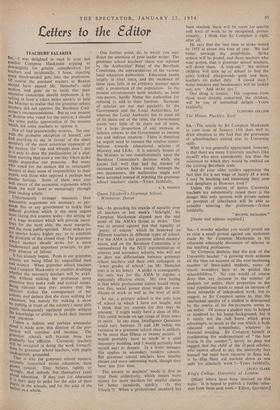&tiers to the Editor
TEACHERS' SALARIES
U1,-1 was delighted to read in your last number Compton Mackenzie arguing so downrightly for greater consideration for teachers and incidentally, I hope, injecting some much-needed guts into the profession. Of course the assistant masters at Buxton should have passed Mr. Henschel's mild motion, and gone on to insist that their executive committee should implement it by calling at least a token strike quickly to help The Minister to realise that the grammar school teachers did not approve the Burnham Com- mittee's recommendations. But as one present at Buxton who voted for the motion, I should like some public appreciation of the reasons -Which led some teachers to oppose it. Not all had praiseworthy motives. No one, with the probable exception of himself, can find anything to say in favour of the sheer snobbery of the most notorious opponent of the motion, the ' cap and whippet man '; nor IS it easy to deny the pusillanimity of a plat- form warning that even a one-day token strike Might jeopardise our pensions. But many Who voted for the motion did so reluctantly because of their sense of responsibility to their Pupils, and those who opposed it perhaps had similar feelings. Some of them were also Well aware of the economic arguments which Made the wolf howl so menacingly through your leading article. Unfortunately stronger measures than reasonable arguments are necessary to per- suade this or any government to tackle that difficult problem which is the most urgent issue facing this country today—the setting up of a wage structure which will provide incen- tives for the most able, the most energetic, and the most public-spirited. Most strikes are for shorter hours, higher pay, or to establish the principle of the closed shop. The grammar 84001 masters should strike for a more fundamental and important principle, to pre- ...Vent dilution of labour. It has already begun. Posts in our grammar schools are being filled by unqualified men and women. When grammar school teachers read Compton Mackenzie or another doubting Whether the necessary teachers will be avail- able without making the profession more attractive they make rude and cynical noises. Minister rational men they assume that the minister wishes the consequences of her actions, and deduce that she cares nothing for education, but merely for making a show by Putting in front of the country's most able Pupils inadequately equipped people without the knowledge or ability to hold their interest and attention. Unless a definite and perhaps unpopular stand is made now, this dilution of the pro- fession will continue and increase. The grammar schools will become none too gradually less efficient. University teachers will be occupied in doing the work formerly done by grammar school teachers, with pupils inadequately. grounded. That is why the grammar school masters,. seriously concerned about .education, have grown cynical. They believe, rightly or wrongly, that. nobody but themselves cares rout education. If they care for education it is their duty to strike for the sake of their 1311Pds in the schools, and for the sake of the nation as a whole.
One further point, sir, to which you may direct the attention of your leader writer. The grammar school teachers' claim was rejected by the Authorities' Panel of the Burnham Committee, the representatives, of the various local education authorities. Education looms largely in local rates, and the incidence of these rates falls in an arbitrary manner upon only a proportion of the population. In the present circumstances most teachers, as local rate-payers, hardly blame the authorities for refusing to add to their burdens. Increases of salaries are not met equitably by the Government and the Local Authorities, for whereas the Local Authority has to meet all of its share out of the rates, the Government meets very little of its share out of taxes, for a large proportion of any increase in salaries returns to the Government as income tax and indirect taxation. There is therefore an urgent need to reassess the relative contri- butions towards educational salaries of Ministry and LEAs. It is scarcely honest of the Minister to rest constitutionally upon the Burnham Committee's decision while she knows full well that had the burden of increased salaries fallen evenly between the two paymasters, the Authorities might well have accepted instead of rejecting the grammar school teachers' claim.—Yours faithfully,
A. R. MAIDEN
Queen Elizabeth's Grammar School, Wimborne, Dorset.


































 Previous page
Previous page